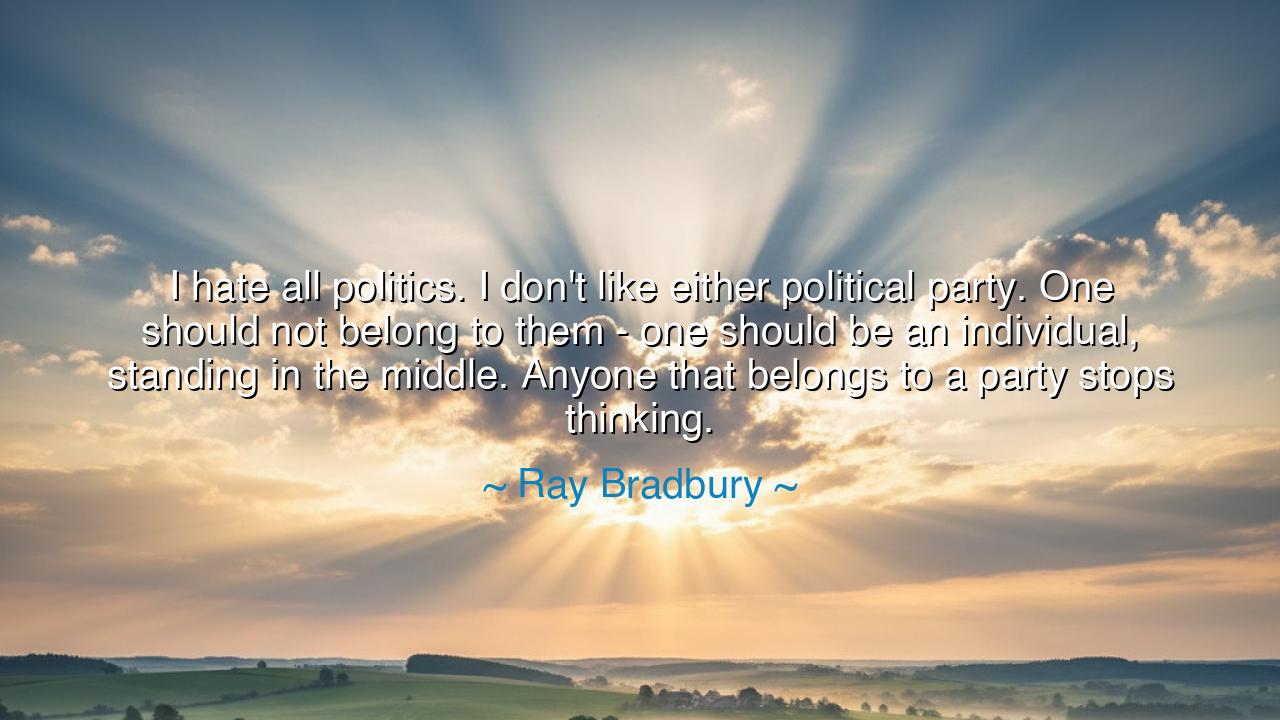
I hate all politics. I don't like either political party. One
I hate all politics. I don't like either political party. One should not belong to them - one should be an individual, standing in the middle. Anyone that belongs to a party stops thinking.






Hear, O seekers of truth, the fierce words of Ray Bradbury: “I hate all politics. I don’t like either political party. One should not belong to them—one should be an individual, standing in the middle. Anyone that belongs to a party stops thinking.” In this cry, the prophet of imagination warns of the peril of conformity. For in his eyes, politics is not the servant of thought but its strangler, and the party is not a gathering of free minds but a cage in which independence perishes.
For parties demand loyalty, and loyalty often silences reason. The individual, once curious and questioning, begins to speak not with their own voice but with the voice of the collective. In this, Bradbury saw danger: the end of independent thought, the surrender of freedom to slogans, the sacrifice of wisdom to the idol of identity. To stand in the middle is not to be lukewarm, but to remain sovereign over one’s own mind, refusing to be absorbed by the tribe.
History bears witness to the truth of his words. In the days of the French Revolution, men who questioned the extremes of either faction were devoured by both. To belong too deeply to the Jacobins or the Girondins was to lose one’s independence, and soon, one’s life. The guillotine fell not only upon tyrants but upon thinkers who dared to step outside the party line. Thus Bradbury’s warning is eternal: the party that promises freedom often ends by silencing its own.
So too in the America of George Washington, who in his farewell address pleaded against the rise of political factions. He saw that they would divide the nation, make enemies of neighbors, and corrupt the work of government. His vision was prophetic, for in time parties did rise, and the unity of the republic was fractured by endless suspicion and strife. Bradbury, centuries later, gave voice to the same lament: that parties reduce the citizen to a weapon in their quarrel.
Therefore, O children of wisdom, learn this: to think is to stand apart, to question even those you love, to refuse the comfort of the mob. Politics will tempt you to take sides, to surrender your mind for the ease of belonging. Resist this. For the greatness of a people lies not in their parties, but in their individuals, free and fearless, who speak with their own voice. Bradbury’s words endure as both rebuke and challenge: do not stop thinking, for in that silence, tyranny begins.






CTcam tu
I understand Bradbury’s frustration with the limitations of party politics, but I also wonder: Can real change happen without collective action through political parties? His idea of rejecting party loyalty in favor of independent thinking is compelling, but does it allow for effective policy change, or does it create a system where no one can get anything done? Could we find a middle ground that encourages independent thinking while still fostering collaboration?
TQtran thi thuy quynh
Bradbury’s disdain for political parties and his idea of standing in the middle is provocative. But how practical is it in today’s polarized environment? Can anyone truly avoid partisanship, or is it an inevitable part of participating in politics? While I appreciate the idea of independent thought, I’m curious if completely distancing oneself from parties can actually create more division or if it encourages a more balanced approach to governance.
NTNha Tram
Bradbury’s rejection of party politics raises an interesting question about the nature of political engagement. Is it truly possible to be an individual in the political arena, or do we need parties to effectively organize and enact change? His viewpoint suggests that political loyalty can cloud judgment, but I wonder if being completely independent leaves one without enough influence in the larger political system.
MUNguyen Hang My Uyen
Ray Bradbury’s quote reflects a sentiment that many people share: frustration with the two-party political system. He argues that belonging to a political party can hinder independent thought, but is it possible to be fully politically effective without aligning with a party? How do we balance standing in the middle while still having a meaningful impact on policy? Does this view undermine the value of collective action or political organization?